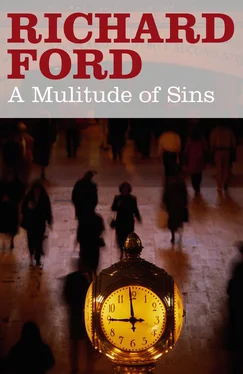Roger sits across the long table, too far away to talk easily. In a room that can conveniently hold five hundred souls, there are perhaps fifteen scattered diners. No one is eating family style, only solos and twos. Young lodge employees in paper caps wait dismally behind the long smorgasbord steam table. Metal heat lamps with orange beams are steadily over-cooking the prime rib, of which Roger has taken a goodly portion. Faith has chosen only a few green lettuce leaves, a beet round, two tiny ears of yellow corn and no salad dressing. The sour smell of the Tyrol Room makes eating almost impossible.
“Do you know what I worry about?” Roger says, sawing around a triangle of glaucal gray roast beef fat, using a comically small knife. His tone implies he and Faith eat here together often and are just picking up where they’ve left off; as if they didn’t hold each other in complete contempt.
“No,” Faith says. “What?” Roger, she notices, has managed to hang on to his red smorgasbord coupon. The rule is you leave your coupon in the basket by the bread sticks. Clever Roger. Why, she wonders, is Roger tanned?
Roger smiles as though there’s a lewd aspect to whatever it is that worries him. “I worry that Daisy’s going to get so fixed up in rehab that she’ll forget everything that’s happened and want to be married again. To me, I mean. You know?” Roger chews as he talks. He wishes to seem earnest, his smile a serious, imploring, vacuous smile. This is Roger leveling. Roger owning up.
“That probably won’t happen,” Faith says. “I just have a feeling.” She no longer wishes to look at her fragmentary salad. She does not have an eating disorder and could never have one.
“Maybe not.” Roger nods. “I’d like to get out of guidance pretty soon, though. Start something new. Turn the page.”
In truth, Roger is not bad-looking, only oppressively regular: small chin, small nose, small hands, small straight teeth — nothing unusual except his brown eyes are too narrow, as if he had Ukrainian blood. Daisy married him — she said — because of his alarmingly big dick. That — or more importantly, the lack of that — was in her view why many other marriages failed. When all else gave way, that would be there. Vince’s, she’d shared, was even bigger. Ergo. It was to this particular quest that Daisy had dedicated her life. This, instead of college.
“What exactly would you like to do next?” Faith says. She is thinking how nice it would be if Daisy came out of rehab and had forgotten everything. A return to how things were when they still sort of worked often seemed a good solution.
“Well, it probably sounds crazy,” Roger says, chewing, “but there’s a company in Tennessee that takes apart jetliners for scrap. There’s big money in it. I imagine it’s how the movie business got started. Just some hare-brained scheme.” Roger pokes at macaroni salad with his fork. A single Swedish meatball remains on his plate.
“It doesn’t sound crazy,” Faith lies, then looks longingly at the smorgasbord table. Maybe she’s hungry, after all. But is the table full of food the smorgasbord, or is eating the food the smorgasbord?
Roger, she notices, has casually slipped his meal coupon into a pocket.
“Well, do you think you’re going to do that?” Faith asks with reference to the genius plan of dismantling jet airplanes for big bucks.
“With the girls in school, it’d be hard,” Roger admits soberly, ignoring what would seem to be the obvious — that it is not a genius plan.
Faith gazes away again. She realizes no one else in the big room is dressed the way she is, which reminds her of who she is. She is not Snow Mountain Highlands (even if she once was). She is not Sandusky. She is not even Ohio. She is Hollywood. A fortress.
“I could take the girls for a while,” she suddenly says. “I really wouldn’t mind.” She thinks of sweet Marjorie and sweet, unhappy Jane sitting on the Danish modern couch in their sweet nighties and monkey-face slippers, watching her trim the plastic rubber-tree plant. At the same moment, she thinks of Roger and Daisy being killed in an automobile crash on their triumphant way back from rehab. You can’t help what you think.
“Where would they go to school?” Roger says, becoming alert to something unexpected. Something he might like.
“I’m sorry?” Faith says and flashes Roger, big-dick, narrow-eyed Roger a second movie star’s smile. She has let herself become distracted by the thought of his timely death.
“I mean, like, where would they go to school?” Roger blinks. He is that alert.
“I don’t know. Hollywood High, I guess. They have schools in California. I could find one.”
“I’d have to think about it,” Roger lies decisively.
“Okay, do,” Faith says. Now that she has said this, without any previous thought of ever saying it, it becomes part of everyday reality. Soon she will become Jane and Marjorie’s parent. Easy as that. “When you get settled in Tennessee you could have them back,” she says without conviction.
“They probably wouldn’t want to come back by then,” Roger says. “Tennessee’d seem pretty dull.”
“Ohio’s dull. They like that.”
“True,” Roger says.
No one has thought to mention Daisy in promoting this new arrangement. Though Daisy, the mother, is committed elsewhere for the next little patch. And Roger needs to get his life jump-started, needs to put “guidance” in the rearview mirror. First things first.
The Pageant of the Lights has gotten under way outside now — a ribbon of swaying torches gliding soundlessly down the expert slope like an overflow of human lava. All is preternaturally visible through the panoramic window. A large, bundled crowd of spectators has assembled at the bottom of the slope behind some snow fences, many holding candles in scraps of paper like at a Grateful Dead concert. All other artificial light is extinguished, except for the Yuletide spruce at the top. The young smorgasbord attendants, in their aprons and paper caps, have gathered at the window to witness the event yet again. Some are snickering. Someone remembers to turn the lights off in the Tyrol Room. Dinner is suspended.
“Do you downhill,” Roger asks, leaning over his empty plate in the half darkness. He is whispering, for some reason. Things could really turn out great, Faith understands him to be thinking: Eighty-six the girls. Dismantle plenty of jets. Just be friendly and it’ll happen.
“No, never,” Faith says, dreamily watching the torchbearers schussing side to side, a gradual, sinuous, drama-less tour downward. “It scares me.”
“You’d get used to it.” Roger unexpectedly reaches across the table to where her hands rest on either side of her uneaten salad. He touches, then pats, one of these hands. “And by the way,” Roger says. “Thanks. I mean it. Thanks a lot.”
Back in the condo all is serene. Esther and the girls are still at the skating rink. Roger has wandered back to The Warming Shed. He has a girlfriend in Port Clinton, a former high-school counselee, now divorced. He will be calling her, telling her about his new Tennessee plans, adding that he wishes she were here at Snow Mountain Highlands with him and that his family could be in Rwanda. Bobbie, her name is.
A call to Jack is definitely in order. But first Faith decides to slide the newly trimmed rubber-tree plant nearer the window, where there’s an outlet. When she plugs in, most of the little white lights pop cheerily on. Only a few do not, and in the box are replacements. This is progress. Later, tomorrow, they can affix the star on top — her father’s favorite ritual. “Now it’s time for the star,” he’d always say. “The star of the wise men.” Her father had been a musician, a woodwind specialist. A man of talents, and of course a drunk. A specialist also in women who were not his wife. He had taught committedly at a junior college to make all their ends meet. He had wanted Faith to become a lawyer, so naturally she became one. Daisy he had no specific plans for, so naturally she became a drunk and sometime later, an energetic nymphomaniac. Eventually he died, at home. The paterfamilias. After that, but not until, her mother began to put weight on. “Well, there’s my size, of course,” was how she usually expressed it. She took it as a given: increase being the natural consequence of loss.
Читать дальше












